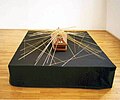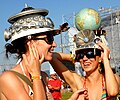Peter Kalmus (artist)
Peter Kalmus | |
|---|---|
 | |
| Born | 28 August 1953 Piešťany, Czechoslovak Socialist Republic (now Slovakia) |
| Occupation | Visual artist, activist |
Peter Kalmus (born 28 August 1953 in Piešťany) is a Slovak self-taught visual artist and activist.[1]
Family background
[edit]Kalmous was born to a German Jewish father of Wolfgang Hans Hartman Kalmus and a Slovak Lutheran mother Mária (née Češeková).[2] Soon after his birth, his parents divorced and his father returned to Germany.[3] In spite of distance, Kalmous and his father reconnected during the Prague Spring and remain very close to this day.[4]
Life during communism
[edit]From early childhood, Kalmous has lived in Košice. Since the 1970s, he was in close contact with Prague underground cultural scene.[3] His own art mainly consists of painting, photography and performance art (commonly taking the form of public, non-violent protest). In 1989, he co-founded the Košice cell of the Civic Forum party. On 21 November 1989 he organized the first anti-regime demonstration in Košice to commemorate the killing of a local student Michal Hamrák by the Soviet forces during the Warsaw Pact invasion of Czechoslovakia.

Life after 1989
[edit]After the Postoj, Kalmus participated at many art exhibitions in Slovakia and abroad.[5] Kalmous considers creating art to be his lifestyle.[6] His work reflects the public obsession with consumerism as well politics, death, religion, sports.[7] He has several long-running projects, including the cycles Partitúry (Scores) and Korózne grafiky (Corrosive Prints). Perhaps his well-known long-term project has consisted of wrapping a wire around at least one stone every day between 1998 and 2022, representing the 70 000 Jews deported from Slovakia by the fascist Slovak Republic during the World War II.[3] A Peter Kalous' Holocaust monument, consisting of four glass tubes filled with the wire-wrapped stones, was first uncovered in 2016 by the President of Slovakia Andrej Kiska. It is located in a renovated synagogue in the town of Lučenec.[8]
Activism
[edit]Kalmus has organized several public protests, which gained media attention. In March 2011 he disrupted the unveiling of a bust of a fascist World War II era politician János Esterházy by throwing toilet paper at the bust.[9] In February 2015 the village of Krajná Bystrá, the birthplace of high-profile communist functionary Vasiľ Biľak, Kalmus together with a fellow artist Ľuboš Lorenz spilled red pain over a bust of Biľak, previously installed there by the Communist Party of Slovakia.[10] In August 2016 he removed the Hammer and Sickle symbol from a Red Army memorial in Košice.[11] The public reactions to Kalmous' activism has been mixed. The liberal Denník N praised the removal of communist symbols from the memorial,[12] while the conservative website Postoj criticized is as a meaningless publicity stunt, disrespectful to the memory of World War II victims.[13]
Selection of Kalmus art
[edit]References
[edit]- ^ "Peter Kalmus". artgallery.sk.
- ^ "Peter Kalmus (1953)". www.memoryofnations.eu. Retrieved 7 November 2022.
- ^ a b c Sudor, Karol (2022-11-03). "33 rokov po: Smútiť za komunizmom je ako smútiť za Leopoldovom či Ilavou, tvrdí Peter Kalmus". Denník N (in Slovak). Retrieved 2022-11-07.
- ^ Sudor, Karol (2017-09-28). "Prečo to ten Kalmus robí?". Denník N (in Slovak). Retrieved 2022-11-07.
- ^ "Peter Kalmus". artandconcept (in Czech). Retrieved 2022-11-07.
- ^ "Peter Kalmus". Pecha Kucha Nights Bratislava (in Slovak). Retrieved 2022-11-07.
- ^ "Agosto Foundation :: Peter Kalmus". agosto-foundation.org. Retrieved 2022-11-07.
- ^ Sudor, Karol (2016-09-10). "Kalmus v Lučenci odhalil dielo na pamiatku obetí holokaustu, nielen prezident Kiska priznal strach". Denník N (in Slovak). Retrieved 2022-11-07.
- ^ Cas.sk (2011-03-14). "Kríky, piskot a lietajúci toaleťák: Takto odhaľovali pomník Esterházymu". Nový Čas (in Slovak). Retrieved 2022-11-07.
- ^ "Výtvarníkov Kalmusa a Lorenza budú pre Biľakovu bustu predsa len súdiť". Petit Press. 2016-11-19. ISSN 1335-4418.
{{cite journal}}: Cite journal requires|journal=(help) - ^ Lendel, Michal. "Súd potvrdil nevinu Kalmusa v kauze osekania kosáka a kladiva". kosice.korzar.sme.sk (in Slovak). Retrieved 2022-11-07.
- ^ "Kultúrnou udalosťou roka 2015 je radikálne gesto dvoch výtvarníkov". Denník N (in Slovak). 19 December 2015. Retrieved 7 November 2022.
- ^ Hanus, Martin. "Pocit trápnosti s Kalmusom a Lorenzom". www.postoj.sk (in Slovak). Retrieved 7 November 2022.













